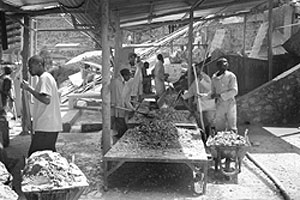The Rwanda Geology and Mines Authority (OGMR), wrote to the American government requesting a delay for tagging all mineral exports.OGMR cannot comply with the set deadline, April 1, 2011, and asked for one year extension, Business Times learned.


The Rwanda Geology and Mines Authority (OGMR), wrote to the American government requesting a delay for tagging all mineral exports.
OGMR cannot comply with the set deadline, April 1, 2011, and asked for one year extension, Business Times learned.
On July 20, 2010, the US President passed the Dodd-Frank Wall Street Reform and Consumer Protection Act, requiring companies to disclose whether they use minerals from DRC or neighbouring countries within nine months.
"I am afraid that despite all efforts that we are making ,the Rwandan mineral industry, in particular the small artisanal mining areas, we will be unable to meet this deadline,” the letter signed by Dr.
Michael Biryabarema, Director General of OGMR, dated February 18 2011, says.
The letter, addressed to the Electronic Industry Citizenship Coalition (EICC) extractives Work Group, underscores that government invested heavily in the mining sector.
However, imposition and purchasing limitations of April 2011 deadline will be a major setback for this programme, it said.
"Let me inform you at this point that mining in Rwanda is the highest export earner, accounting for about 30 percent of total exports. This would not only affect the balance of payments but also the loss of tax revenue,” Biryabarema says.
According to OGMR statistics, the country’s mineral exports fetched approximately $74 million in 2010 compared to $54.6 million earned in 2009.
While the ‘conflict minerals’ legislation is not intended to impose a trade embargo, Biryabarema warns that this may be the outcome if "we do not come to a workable solution.”
OGMR notes that, since December 2010, Rwanda is implementing the iTSCi, an internationally recognized tagging and sealing system to facilitate the process.
If the law takes effect this year, companies sourcing minerals must submit an annual report to the Securities and Exchange Commission (SEC) detailing measures taken to exercise due diligence in their
supply chain.
This new law affects companies like IBM, Intel, Motorola, Apple and HP. There is fear these companies may source their suppliers from other mineral producing countries to avoid being associated with conflict minerals and the costs involved in carrying out private audits.
These companies are large consumers of Tin, tungsten tantalum, 3T’s and gold from the DRC and neighbouring countries.
With the iTSCi operational, OGMR says larger mine sites are already in line with the regulations to preserve access to international market.
"The Rwandan mineral industry has more than 30,000 small miners working on remote sites. It is likely that we will be unable to include all such mines within the new system until sometime next year,” Biryabarema explains.
OGMR, requests for a phase in period for ‘smelter’ auditing until end of 2012, which is seen as a realistic deadline.
"Our mineral exporters have been informed by all the large buyers that they are unable to take untagged and untraceable material after the end of March as a result of EICC/GeSI requirements,”
OGMR further underscores , adding that that the exclusion of artisanal miners from the system could halt source of livelihood for many.
Ends


